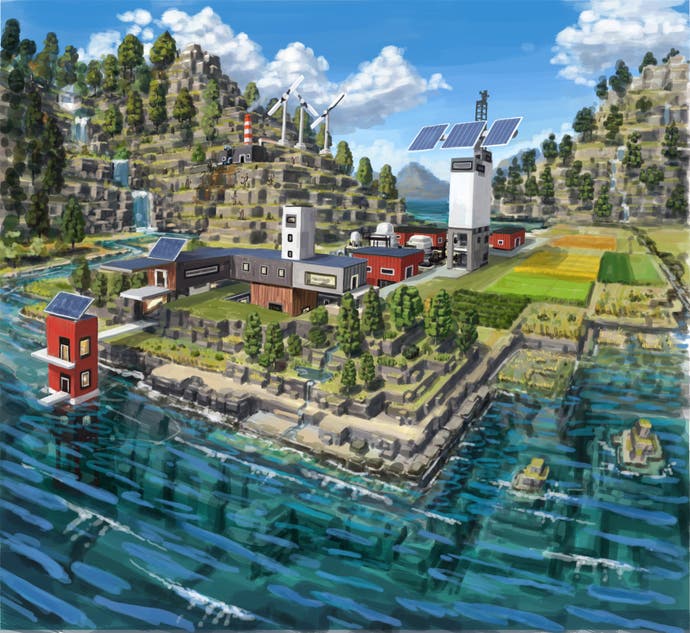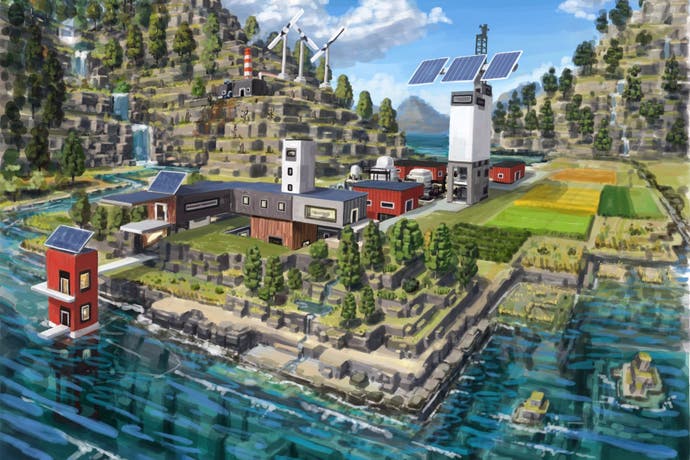Introducing Eco: An ecosystem sim where everyone must nurture a shared planet
Or face server-wide permadeath.
Eco is one of the most ambitious and original concept I've seen in a while. It tasks players with manipulating an ecosystem with one catch: all players on the server are working in the same environment. If the community fails to nurture the nature, it's permadeath for everyone and a new planet is spawned.

Each time a server is started, it begins at the dawn of civilisation. There will be some ecological disaster looming on the horizon, such as a flood, drought or meteor, several real-time weeks away. The community must advance their civilisation enough to thwart these deadly threats or it's bye bye cruel world for everyone.
But it won't just be a simple matter of clicking on panels to produce factories. Instead, players will have to use elements of nature. Plants and animals will have their own lives. Raze a forest without replanting it and you'll run out of materials to erect buildings. Eat too many of one kind of fish and they'll become extinct, which will have an adverse effect on those who prey on them. Build a factory too close to a river and you'll pollute it.
"This ecosystem is your only lifeline in a race against time, your source of resources that will either prevent humanity's destruction, or become the source of its destruction when the group squanders its resources," developer Strange Loop Games explained. "Thus you're facing two existential crises simultaneously: an external threat that you must avert, and the threat of causing your own destruction. A rock and a hard place."
To prevent trolls from simply ruining the game for everyone, the community will be able to vote on laws dictating the rules of the game. An example Strange Loop offered on its official site is that a group can vote on a law mandating that each person can chop down no more than 10 trees a day. After that, the game simply won't let you cut down another.
Thankfully, Eco will include its own graphs with all manner of ecological data, so players will have a greater sense of what's happening in the world beyond what they can see with their own two eyes.
"Despite everyone occupying the same world and having the same interest in its survival, individual incentives will make for vastly different positions," the developer explained. "Is your character a lumberjack specialising in cutting down trees for their livelihood? You're likely going to have a different idea as to how many trees should be allowed cut down than others. We're all in this together, and yet the only enemy is ourselves, the individual's needs vs the group's."
Eco will allegedly have so much educational value that the US government's Institute of Education Sciences is helping fund it via a grant. "This project will develop and test Eco, an online multiplayer virtual environment and game designed to enhance middle school students' knowledge of ecology and environmental literacy," explained the government in its grant summary.
"This is important because according to the 2011 National Assessment of Educational Progress, students in the United States ranked 17th in science among the world's most developed countries, and over a third of eighth-graders scored below basic level, the lowest performance level. The Framework for 21st Century Skills presents the need for education materials that engage students and use technology effectively, meet rigorous content and skill standards, foster interdisciplinary work, and promote collaborative problem solving."
The government has already run a pilot program testing the effects of Eco on 60 students across five classrooms. "The prototype functioned as intended," the government stated. "Students found the game to be engaging, and that students were able to collaborate with classmates during gameplay."
Upon completion, researchers will test the final product across 150 students in 10 classrooms. "Half of the classrooms will be randomly assigned to use Eco to supplement standard classroom instruction while the other half will continue with normal practice. Analyses will compare pre-and-post scores of student's ecology knowledge and environmental literacy."
That's right, the government is testing video games on our children. No wonder the Polybius legend is so rampant.
While government funding will help, it won't entirely finance Strange Loop. Creative director and executive producer John Krajewski told Eurogamer that a Kickstarter is planned to launch near the end of this month. In the meantime, Eco is already on Steam Greenlight.
"I believe games can be a lot more than they typically are, they can take on rich real-world topics with a depth and meaningfulness that rivals any other form of media, and we want to push how games are thought of with Eco," the developer stated. "Many games are designed to allow the player to escape their world, we want to make a game that does the opposite: a game that engages the player deeply with the real world through a concentrated virtual recreation of it."



